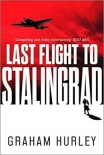Last Flight to Stalingrad by Graham Hurley (simple ebook reader .TXT) 📗

- Author: Graham Hurley
Book online «Last Flight to Stalingrad by Graham Hurley (simple ebook reader .TXT) 📗». Author Graham Hurley
Both Goebbels and Nehmann, master and servant, knew that ‘make good’ was a slippery little verb, just short of an outright lie, and there’d once been a time when Nehmann would have been baffled about what he was supposed to do. Could he summon battalions of infantry? Columns of tanks? Squadrons of Richthofen’s heavy bombers? Or was it really possible to marshal public opinion with nothing more than pen, ink and an untroubled conscience? The latter, of course, had now become a way of life and when he and Goebbels had parted on the pavement beside the Minister’s sleek Mercedes, he’d asked whether or not to expect more detailed instructions.
‘Not at all, Nehmann.’ Goebbels was in the best of moods. ‘Do what you always do so well. Make us happy.’
And so, there it was. Happy. A quarter of a million men digging themselves deeper and deeper into the frozen steppe, into the wreckage of a ruined city, into any hole that would offer shelter from Russian fire. Happy.
Nehmann turned his attention to the editorial in Das Reich. The war, in Goebbels’ eyes, was virtually over and now it was time to imagine the kind of world in which the entire nation would undoubtedly find themselves.
‘We are dreaming of a happy people in a country blossoming with beauty,’ Goebbels had written, ‘traversed by wide roads like bands of silver which are also open to the modest car of the ordinary man. Beside them lie pretty villages and well laid-out cities with clean and roomy houses inhabited by large families for whom they provide sufficient space. In the limitless fields of the east, yellow corn is waving, enough and more than enough to feed our people and the rest of Europe. Work will once more be a pleasure and it will be marked by a joy in life which will find expression in brilliant parties and a contemplative peace.’
Nehmann reached for his beer, only too aware of the thinness of the lie. A busy man, he thought, reaching for a handful of straw to toss to his readership. Pretty villages? Fields of waving corn? Brilliant parties? These were clichés. The writing was perfunctory. Neither Goebbels nor anyone else would ever believe this shit. It might draw a nod of assent, and even a smile, from the likes of Hitler and Goering, an important audience for the tricksters at the Promi, but no one else would be fooled for a moment. Certainly not the old man in his bookshop. And certainly not anyone with a moment’s experience, first-hand or otherwise, of life on the Eastern Front.
Nehmann closed the magazine and was about to toss it aside when he had second thoughts. Maria, he thought. When she comes back from Munich.
That night, he listened to her on the radio. Since he’d been away, she’d added to her repertoire. She played Liszt and Mozart, as well as a Beethoven sonata, and he smiled when the moment of silence at the end of her performance was swamped by applause. Acclamation like this, thought Nehmann, was genuine, a response to the music, something way beyond the reach of the Third Reich. This afternoon, so different, had been orchestrated for the groundlings in the Sportpalast, a very different audience, almost a sub-division of the Promi. They wanted to be lied to. They thrived on fantasy. Hence the near-hysteria in the hall at the end and the sour reek of the Führer’s efforts backstage afterwards. Brilliant parties, he thought. And the blessings of a contemplative peace.
Maria returned two days later. Nehmann, alerted by the Promi, was about to leave once again for the long two-stage flight back to Stalingrad. He’d harvested a couple of handfuls of chillis from his pots on the windowsill, a present for Schultz, and he was about to pack the three remaining bottles of Bordeaux from Guram’s cellar when he heard Maria’s key turning in the door. He met her in the hall. She looked exhausted. He tried to hold her close and said he was proud of the performance in Munich. She could see his bag readied by the door. She understood at once what he was really saying.
‘You’re going back?’
‘I am.’
‘Because you have to?’
‘Partly. Partly not.’
‘You want to go back?’
‘I have to go back.’
Nehmann was looking at her. The question he expected was ‘why?’ but it never happened. Instead, she wanted to know whether he’d managed to lay hands on a Russian dictionary.
‘Yes.’
‘At the bookshop I mentioned?’
‘Yes.’
‘And you met the bookseller?’
‘I did. Fabulous man.’
‘Good.’ At last she kissed him. ‘That’s my father.’
27
STALINGRAD, OCTOBER 1942
Schultz was delighted with both dictionaries. He and his tiny staff were still occupying their basement quarters in the bus depot, and when Nehmann enquired about the state of the battle the Abwehr man simply shrugged. The young Georgian prisoner, Kirile, was now part of the team. With his help they’d been monitoring Soviet command transmissions and it was obvious that the Russians, like Sixth Army, were exhausted. They’d fired too many bullets, too many mortar bombs, too many artillery shells. They were running out of targets, as well as munitions, and the following day – as if by some psychic act of collaboration – the shooting more or less stopped.
A sudden silence descended on what remained of the city, punctuated by occasional small-arms fire and the sharp bark of exploding landmines, often triggered by horses. In the aftermath, as Nehmann discovered, ration parties would descend on the corpse of the dead animal, men with axes and combat saws, everything muffled against





Comments (0)